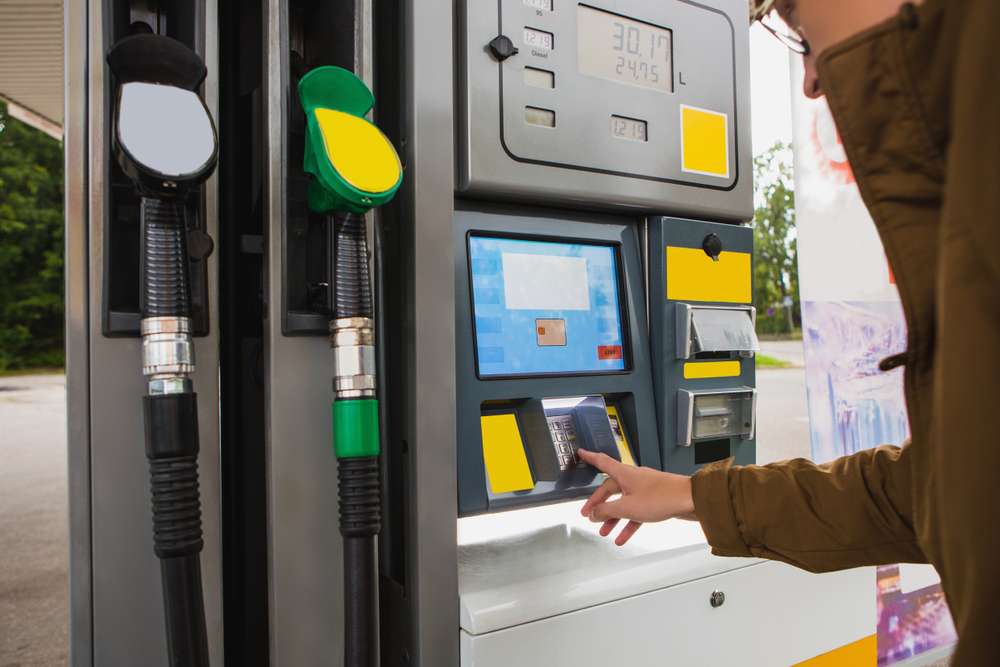In a volatile fuel market where prices are on an upward trend and unpredictable, it becomes challenging for fleet owners to maintain a tight budget and reduce expenses. An effective fuel management system can help reduce fuel consumption and improve productivity towards better profitability.
A fuel management system improves your visibility into fuel consumption patterns and associated costs and provides fuel monitoring and reporting tools to control consumption. This helps you track fuel efficiency metrics and prevents unnecessary consumption and fuel fraud.
With fuel management systems implemented with telematics integration, you can access real-time fuel data and take prompt actions to improve fleet efficaciousness by addressing technical issues, controlling driving behavior, and adopting fuel efficiency best practices.
This article will discuss how the fuel management system can help you improve your fleet effectiveness and fuel consumption through a sophisticated, analytical, and automated process.
What is A Fuel Management System?
Fuel management systems combine hardware and software solutions that can help you track, control and optimize fuel use and save costs.
The hardware component uses GPS-enabled telematics systems to access and send real-time vehicle information.
Fleet management software receives and processes this real-time data to provide valuable insights regarding the fleet’s fuel consumption, effectiveness, and operating costs.
Benefits of Fuel Management System
A fuel management system is a reliable solution that improves fleet potency and reduces costs. Like any other tool, it provides some remarkable benefits you would like to know in detail. Go through the points below to know the top benefits that can bring positive, data-driven changes in your fleet operations.

Improve Fuel Economy
Fuel economy is a vital parameter to evaluate business productivity and profitability. Are you looking for ways to identify assets that do not contribute to fuel economy and increase costs? The fuel management system with tracking tools makes your task easier.
You can quickly track odometer readings and the quantity consumed to monitor the vehicle’s fuel effectivity over time through the data collected. By comparing the fuel economy baseline against its consumption, you can determine how closely your trucks are performing to expectations. As you detect deviations, you focus on the root cause and take action to improve the asset’s fuel economy.
Prevent Fuel Theft And Misuse
Managing a fleet of vehicles can be challenging if you need a reliable system to restrict fuel theft and misuse. You must know consumption trends, location-specific purchases, and refueling frequency. The fuel management system helps you analyze whether the volume of investment and consumption matches the listed fuel capacity of the asset.
When integrated with GPS-enabled solutions, you will get system alerts if the vehicle’s fueling location and frequency differ from the desired. It would indicate any unauthorized activity that needs immediate attention. Fuel management systems also can notify you when fuel levels decrease rapidly within a time so that you can promptly deal with cases of theft and misuse.
Streamline Fuel Tax Reporting
IFTA reporting is a mandatory requirement by integrating fuel consumption data and generating reports for tax calculation. Are you looking for better and easier ways to conduct your IFTA reporting?
The fuel management system has provisions to automatically collect fuel data and present the required reports for quick access and analysis.
If you want to filter out the data for location-wise fuel purchase and fuel type, you can set up other customized reports that can cover a wide range of information. The best part is that the entire IFTA process is automated.
👉The IFTA automation process provides you with the following benefits:
|
Promote Good Driving Habits
As already mentioned, how you drive impacts your vehicle’s fuel efficaciousness. A fuel management system helps you identify aggressive driving behavior like speeding, hard acceleration or braking, and unnecessary idling through the installed in-vehicle sensors. This critical information lets you control dangerous and inefficient driving practices that lead to excessive diesel consumption.
Fuel management data also help you identify drivers who need proper coaching.
The training intends to make drivers aware of the fuel economy and associated costs and makes them more accountable for cost reduction. You can leverage the fuel management system data to track good fuel conservation behavior and encourage drivers to adopt good driving habits.
Access To Fuel Data
An automated fuel management system takes your fleet efficiency to another level by consolidating vehicle information and tracking driving activities. It enables you to record information on the quantity and frequency of fuel purchased, giving you a better understanding of consumption patterns.
Additionally, it generates automated reports on transactions, billing, etc., to provide you with in-depth insights into the fuel cost. The fuel management tools allow you conveniently access, arrange, and analyze fuel data for actionable business decisions. By eliminating instances of error associated with the manual process, you can be sure about data accuracy and reliability.
GPS Tracking
With fleets on the move, there can be little control over the drivers that might take the vehicle beyond specified routes and locations. It would result in the wastage of valuable fuel with productive output. How do fuel management systems help in this regard?
The advanced systems allow you to integrate GPS tracking tools with the fuel management system that gives you real-time location details of your fleet. You can create a virtual geo-fence zone to monitor and control truck movements and curb fuel consumption. As you can manage your truck movements within specified routes, you can optimize your fuel consumption.
Route Optimization
While on the road, your vehicles may encounter traffic congestion and unfavorable road conditions that make the routes longer and more time-consuming. It will result in excessive diesel consumption.
Fuel management systems integrated with GPS location tracking can provide real-time data on optimized routes considering parameters like:
- Distance
- Speed
- Traffic conditions
- Road blockages
- And more
Using historical data and monitoring of real-time road conditions, your fuel management system can suggest the best route between starting and arrival points that can save time and ensure improved fuel effectiveness. You can compare fuel spend between courses to determine optimum paths and accordingly make informed adjustments.
Fuel Card Integration
A fuel card is an effective tool for fleet management that keeps track of the quantity, frequency, and cost of fuel purchased with location details. As you integrate a fuel card with GPS-based fleet management solutions, it records and validates fuel purchases by exchanging data to make you informed and up-to-date.

A few advantages of fuel cards include the following:
- You can set transaction limits to restrict overconsumption and unauthorized purchases.
- Can experience clear visibility of an individual driver’s fuel spending.
- Helps you keep track of your expenses and control spending
- Minimize fuel costs and saves money
- Enhance reporting process
Implementing Fuel Management System In Fleet Operations
Fuel Management solutions provide numerous benefits by saving fuel costs and maximizing profits. If you have decided to implement the fuel management system to streamline your fleet operations with better monitoring and control of fuel use. In that case, you need to know the steps discussed below in the implementation process,
Evaluating Needs For Your Fleet
- You must select and implement a fuel management system depending on your fleet size, type of vehicle, and operational requirements.
- It may offer you various features, but you must review the most relevant aspects that meet your business needs.
- You must review issues concerning fuel use, control, and expenses and analyze how the system will benefit you.
Selecting The Right Fuel Management System for Your Fleet
- There are systems with different levels of features, so picking the method that best suits your requirements becomes crucial.
- Analyze what you are trying to achieve by implementing such a system and balance the benefits in cost, time, and resource savings.
- Cost-benefit analysis helps you assess the system’s return on an investment relative to your budget, considering the savings it could help you obtain.
Installation And Setup of Fuel Management System
- The fuel management system integrates hardware and software to access, process, and share fuel data.
- Depending on the features and functionalities you will utilize, the installation process may vary from simple to complex.
- With professional help, you can build a robust fuel management monitoring system.
Training and Educating Fleet Personnel
- You can complete your fuel management system by informing drivers of its significance.
- Drivers are the key personnel in handling fuel purchases and transactions, so they must be a part of the implementation process.
- Guide your drivers with suitable training and coaching to help them follow driving behaviors that lead to fuel savings and cost reduction.
Best Practices for Maximizing Fleet Efficiency with Fuel Management Systems
A fuel-efficient fleet management system is vital for fleet enterprises to deal with rising fuel costs. Besides employing technology and training, you must follow some best practices to improve fuel efficiency and cut costs.

Regular Monitoring And Analysis Of Fuel Data
- Use your system effectively to gather fuel data.
- Track vehicle routes, mileage, fuel consumption, and purchase frequency
- Utilize modern tracking technology for easy accessibility of data.
- Gain better visibility of fleet performance.
- Leverage advanced AI-powered solutions for capturing and analyzing data.
- Make informed decisions based on accurate and reliable data analysis.
Setting Fuel Consumption Targets And Benchmarks
- Setting targets to align all strategies and actions towards implementing cost control measures.
- Fixing limits of spending and monitoring the same through the use of fuel management tools.
- Set fuel consumption targets based on vehicle age, performance, routes, load, and other factors and monitor the same.
- Following customized reports to monitor and assess how your vehicles and drivers perform compared to set benchmarks.
Implementing Fuel-Saving Strategies Based On Data Insights
- Use fuel data and relevant information to focus on areas that can contribute to fuel efficiency.
- Implement suitable strategies regarding fleet optimization to control excess fuel use and cut costs.
- Develop action plans for vehicle upkeep and fleet maintenance to improve fuel economy.
- Promote fuel-efficient driving practices and techniques and guide drivers to adopt the same.
- Set up suitable monitoring methods to prevent fuel fraud, unauthorized purchases, and misuse.
Maintaining And Updating Fuel Management Systems
- Update the technology-driven fuel management system to ensure optimal performance.
- To make the fuel management system more effective and relevant, you need to upgrade it with new features.
- The design of the fuel management system should be flexible enough to support changes in requirements.
- Make adjustments and additions regularly to improve performance and create solutions to meet specific needs.
Ensuring Compliance With Fuel Management System Usage Policies
- Prepare customized solutions as per your specific business requirements.
- Adhering to policies and procedures can enable you to utilize advanced features and offer flexibility, scalability, and security.
- Save fuel costs and utilize them for developing, upgrading, and using facilities more effectively.
- Ensure compliance with the terms of usage recommended by service providers.
Conclusion
An effective fuel management system provides more accurate, relevant, and timely data to give an in-depth view of the fleet’s fuel usage. You can thoroughly monitor spending related to daily operations purchased through fuel cards and consumed by trucks to determine fuel efficaciousness issues. The most effective techniques will help you focus on improving mileage, modifying driver behavior, and addressing maintenance needs.
Comprehensive fuel management includes monitoring the expenditure accurately, automatically reconciling fueling with transactions, identifying suspected fuel fraud, and rectifying costly driving behavior through proper training and incentives. Eventually, it would ensure reduced operational costs and more sustainable and efficient fleet operations.
Frequently Asked Questions
How does a fuel management system improve time efficiency and accuracy level?
Ans. The fleet management system applies an automated process of data capturing, processing, and generating reports based on engine data. It tracks volume, frequency, and fuel purchase cost precisely and accurately. Again, by automating the process, you can ensure avoiding mistakes that can happen with manual processes.
What are the best driving practices that help reduce fuel consumption?
Ans. Drivers must avoid harsh braking, and quick acceleration, reduce overload, regulate speed, avoid idling, and optimize routes to reduce fuel consumption. The offensive driving behavior also leads to rapid wear and tear of vehicle components and causes higher fuel consumption.
How do fleet optimization and planning help improve fuel efficiency?
Ans. A fleet includes a range of vehicles, some of which must perform better to run to their maximum efficiency and consume more fuel than required. Fleet optimization and planning involve replacing inefficient or underutilized vehicles with more fuel-efficient commercial vehicles to improve mileage and reduce costs.
How do fuel cards help as an efficient fuel management tool?
Ans. Fuel cards allow the fleet manager to track fuel-related expenses and apply necessary control measures to restrict spending. It also provides valuable data regarding fuel usage patterns and fuel efficiency of individual trucks so that you can make informed decisions and proactively control fuel expenses.
James Johnson is a former truck driver who now works as a writer, specializing in the trucking industry. With over 15 years of experience on the road, James has a unique perspective on the challenges and opportunities faced by truck drivers and the trucking industry as a whole. His writing focuses on issues such as safety, regulation, and the latest industry trends. His work has been featured in several trucking publications and he has received recognition for his contributions to the industry. In his free time, James still enjoys being around trucks and often attends truck shows and other industry events.


